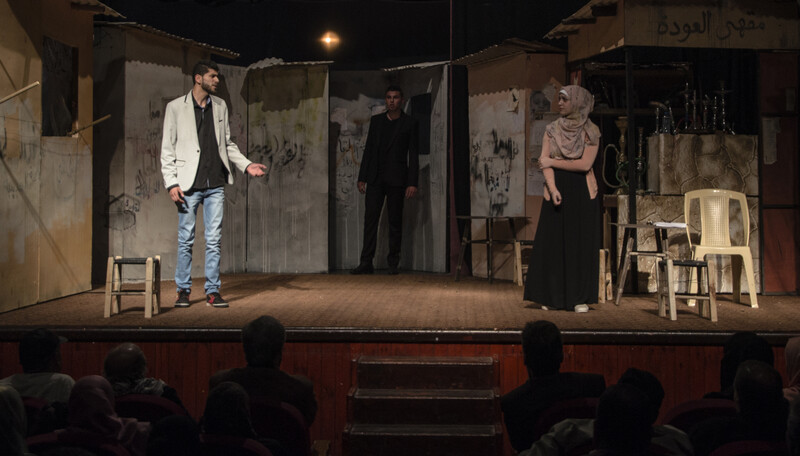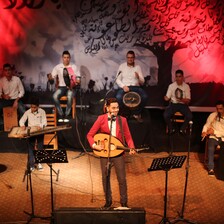The Electronic Intifada Gaza Strip 9 May 2016

A scene from Romeo and Juliet in Gaza.
Romeo and Juliet in Gaza offers a Palestinian twist to William Shakespeare’s famous play.
The two lovers in the title not only face hostility between their families; they also have to deal with the hardship caused by occupation. The limited opportunities in Gaza force the Romeo character to emigrate. Juliet is left behind.
The adaptation of Shakespeare’s play is the work of Atef Abu Saif, author of several novels, as well as The Drone Eats With Me, an account of Israel’s 2014 attack on Gaza.
Romeo and Juliet in Gaza is currently being performed in al-Mishal Theater in Gaza City. The production has been made possible by a grant from the Rosa Luxemburg Foundation, a German group.
Going to the theater is becoming an increasingly rare treat for people in Gaza.
“The money for theatrical productions is lacking,” said Abu Saif. “Most productions are financed by external donors.”
The siege imposed by Israel for almost a decade has affected the arts, along with most other aspects of life in Gaza. Abu Seif suggested, however, that the underlying problems can be traced back even further.
Developing a national theater has not been a priority for the Palestinian Authority since its inception in 1994. The result, noted Abu Saif, is that many of the venues in which plays are performed do not even have a proper stage. “That in itself is an obstacle,” he said.
Ali Abu Yassin, the director of Romeo and Juliet in Gaza, used to run a theater at the Holst Cultural Center in Gaza City. Because of financial difficulties, he had to cease organizing performances there around 10 years ago.
He had hoped that the Oslo accords which led to the creation of the Palestinian Authority would prove beneficial for theater and cinema in Gaza. “Our dreams have not come true,” he said. “Can you imagine that in all of Gaza, there is no proper cinema?”
Hamas, the party running Gaza’s internal affairs, is perceived as hostile to entertainment. Film director Khalil al-Mozayen notes that the old Hurriya cinema in the Khan Younis area now houses an institution for religious study.
In his new project — titled Gaza 36mm — al-Mozayen addresses “why some cinemas were shut down and others were turned into something completely different,” he said.
“We need laughter”
Al-Mozayen’s office was destroyed by Israel when it bombed Gaza in 2014.
He has continued to make films. Among the difficulties he faces is censorship by the Hamas-led administration.
“Sometimes we are forced to edit or change scenes — like romantic or intimate scenes,” he said.
Atef Asqul, an official dealing with theater in Gaza’s culture ministry, said: “We do not intervene in productions, except for some scenes. We do so quietly, without putting anyone under pressure.”
Jamal Abu al-Qumsan, a veteran actor and director, does not concur. “We are not allowed to have fun,” he said. “There are many good stories to tell about Gaza. But we are always censored by the authorities.”
Some artists are challenging the censorship. In late March, Nabil Diab gave a stand-up comedy performance in al-Mishal Theater. He used the occasion to criticize the conservative nature of Gaza’s society.
“I hope that comedy will become more popular in Gaza,” he said. “We need laughter here — so badly.”
Abu al-Qumsan estimates there are approximately 300 actors in Gaza. Most have not received formal training, however.
Theatre Day Productions is Gaza’s only drama school. Founded in 1995, it has kept going despite the siege and Israel’s attacks.
Jackie Lubeck, a director of the school, said that Israel’s bombing of the strip has curtailed its activities. Because of interruptions, it can take students four or five years to complete a diploma course that should last only three years.
“After the war of 2014, the whole of Gaza remained in a state of rehabilitation for nearly six months,” Lubeck said.
The enthusiastic response to Romeo and Juliet in Gaza suggests that people would relish the opportunity to have more plays and films to watch.
“I would like to be able to go to the theater or take part in similar activities every week,” said Abdel Karim Jabber, a 20-year-old. “We need to find a way of escaping the hard realities of life.”
Rami Almeghari is a journalist and university lecturer based in the Gaza Strip.





